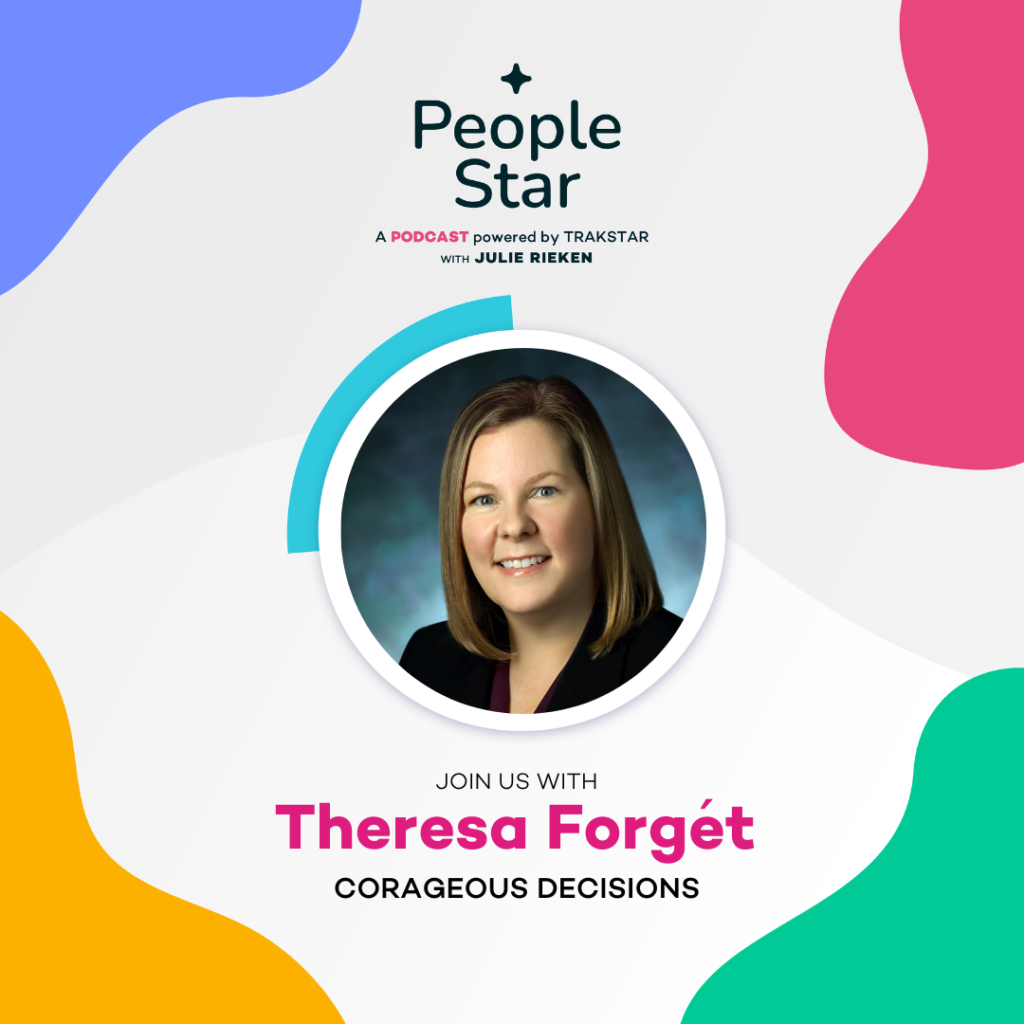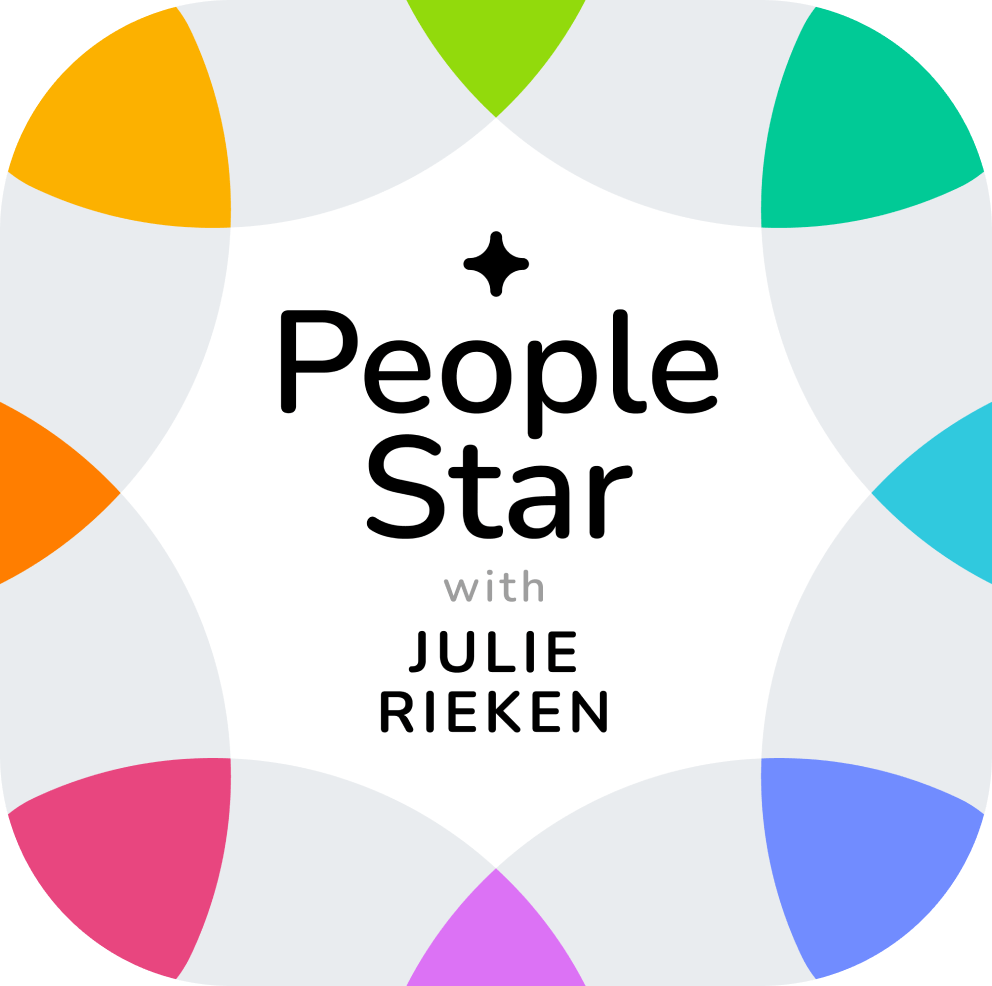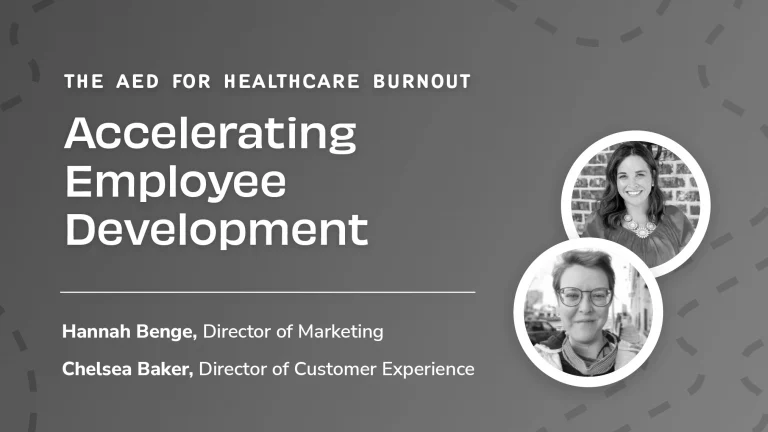PeopleStar_Teresa Forgét: this mp3 audio file was automatically transcribed by Sonix with the best speech-to-text algorithms. This transcript may contain errors.
PeopleStar Intro/Outro:
Welcome to the PeopleStar Podcast. We deliver leadership perspectives from industry experts on their people, architecture, routines, and culture as they solve HR's newest challenges. And now your host, Julie Rieken.
Julie Rieken:
Hello podcast listeners. I'm really excited today, I've got Theresa Forgét with us. She has a fascinating personal story that I think will be of great interest to the people that listen to us most, HR directors, and her story is one of growth in HR, but it's more than that. It's about courageous decisions, to follow things that you love, and she's got some fascinating background here on how she is now and how she arrived at being the Executive Director of Human Resources at the Howard County General Hospital, which is a part of the Johns Hopkins healthcare system, which is really tremendous. Theresa, welcome to the podcast!
Theresa Forget:
Thank you so much for having me. I'm excited to be here.
Julie Rieken:
Me too. So there's so many things we could talk about, you being in healthcare, the pandemic, we could talk about nursing shortages, we could talk about how you're fighting for people, but your personal story is the one that captured me the most. And I'd like for you to share it with our listeners, because I know that a lot of HR directors are looking to grow in their role, and some of the things that you've done I think are fascinating. So Theresa, if you don't mind, one of the things, I'm just going to start with this HR was not your first career. In fact, you started in higher education administration and student affairs and then made a courageous choice to change. Can you just tell us about where you started and then what prompted the shift? And let's, let's take a progression here, on how you, how you are currently in this super cool role.
Theresa Forget:
Sure. So I went to graduate school immediately after college and I was studying student personnel administration, and I started working in student affairs and realized within a couple of years that it wasn't something I was passionate about, it wasn't a great fit for me. And so I just decided to leave and I actually moved back in with my parents. I was in my early mid-twenties and I just moved home, it was a rather humbling experience and I realized what I liked about the role in student affairs was recruiting and finding talent for the organization. So I started sending out my resume to organizations and obviously with no experience, the choices were limited. But a company called me who, recruited for travel nurses, and so I became a travel nurse recruiter and I spent a couple of years recruiting nurses to move all around the country. I completed a three-month travel assignments and it was the hardest job I've ever had. You have to convince people to not only change their lifestyle, but take a job in a strange place, we provided them housing and benefits, but it was more of a life choice in addition to a career choice, and at the time it was challenging. Now everyone wants to be a travel nurse because the pay rates are phenomenal, but at the time it was very challenging.
Julie Rieken:
… It was challenging, and this was a sales job. This was.
Theresa Forget:
Correct.
Julie Rieken:
This is a tough conversation. You're not just saying, hey, can I give you a discount on a product? You're convincing someone to change their life.
Theresa Forget:
Yes, yes. And often bring their families. And, you know, any complaints they had about housing, I would get. So you have to also keep the relationship with them during the assignment. So hopefully they sign on with you again. So it was definitely the hardest job I've ever had and it was a great introduction into HR.
Julie Rieken:
Yeah, okay, that's phenomenal. And how courageous was it to drop that and then to pick up this really hard job? Okay, continue. What happens next?
Theresa Forget:
So I wanted to work for an organization where I was, you know, engaged in the mission, invested in what we were doing. And so luckily, I had an opportunity at the number one hospital in New York, New York Presbyterian Hospital, and my supervisor at the time was starting a sourcing team. So we were the original sourcing team for the health system, and I was the only source for all of nursing. So we would contact all nurse applicants within one business day and send them over to the recruiter at whichever hospital had appropriate openings, and the best fit for the candidates. Really high volume, really hard work, the benefit was that folks were applying being the number one hospital in New York, you have a flurry of applicants, the challenge was sort of filtering through them and making sure that you're getting the top talent. So that was, that was my next step.
Julie Rieken:
That's, you were telling me about your Monday mornings. Can you just tell people what that looked like because they're not small?
Theresa Forget:
Yes. So Monday mornings or certainly Tuesday after a holiday weekend, we're the worst because I would have at least 400 applicants that I'd have to go through and contact. And we contacted every single one of them.
Julie Rieken:
Theresa, that's just massive, that's a lot. Well, let's congratulate you on, have you seen Top Gun? Miracle number one, miracle number two.
Theresa Forget:
Yes!
Julie Rieken:
Okay, so you're doing this, this is at New York Presbyterian, the number one, one of the number one hospitals in New York, and then you make another shift, tell us about that.
Theresa Forget:
So I, I wanted to continue to grow and develop. And MONTEFIORE Health System had an HR business partner model in place that was rather successful. So I applied for a senior recruiter role there and got that position and started recruiting for all areas of the hospital, clinical, non-clinical, administrative, everything, and that was full cycle recruitment, so that was necessary practice for me to be able to continue to grow and develop. And I knew that if I did well, I could hopefully get promoted into a business partner role, and sure enough, I did a few years later.
Julie Rieken:
That's fantastic. So you you took your next leap. You obviously had the recruiting background and now you've expanded into something even larger at MONTEFIORE. Tell us more about what that looked like, and you mentioned MONTEFIORE was acquiring other entities, that's a big shift, too. Can you tell us about this expanded role and then what happened and how you grew?
Theresa Forget:
Sure! So I became a business partner, and in the time that I was a business partner, which was about four or five years, the way the organization was structured was shifting dramatically. We became MONTEFIORE Medicine, we had acquired three main hospitals, I was doing site-based business partner work as well as clinical service work across all entities. So there were a few shifts during that time. And then we continued to acquire further north in New York and into Westchester County. At that time, they were looking for a lead of HR for our community hospitals. And so my vice president and I discussed it and I became the senior director of HR for two community hospitals, a school of nursing, and our long-term care facility.
Julie Rieken:
Okay, so you weren't busy at all.
Theresa Forget:
It was, I mean, it was a really interesting time. There was a lot of history, particularly in those community hospitals, that we needed to really ensure that we didn't have tremendous turnover because that history is so important and because it's a community hospital, the people that work there live in the community, and we always want to make sure that our employees are taken care of so that folks come to us for healthcare as well. So on my team, I then oversaw all of HR in a more traditional sense. We did everything on-site except for benefits administration, that was done by the health system. But everything else was locally, and half of my team were folks who had been at the community hospital for over 20 years and the other half were brand new with the acquisition. So it was really important to build the team so that we could work well together.
Julie Rieken:
That's amazing. Now, throughout this, here you are, you're going from higher ed to recruiting traveling nurses to sourcing hundreds of people from New York Presbyterian to then being a senior recruiter for MONTEFIORE. How were you building your, how were you building your HR knowledge throughout this? Do you have resources that you use and how did you advance? I mean, very clearly you have courage and hard work ethic here, but you needed HR knowledge. How did you build that throughout? What did you do?
Theresa Forget:
So I think I knew what I wanted to do, so I learned on my own. So when I was given the opportunity to be a business partner and the reason why my leader selected me was because I had the education background, so she said she always look for folks who had two areas of HR. So the education and training I had through my experience in higher ed and then the recruitment. And as a recruiter you get a lot of experience maybe lightly so, but certainly dealing with labor relations in some ways because employees will always call the recruiter. So any time that came up, I would then reach out to my colleagues and learn more about the situation. And as soon as I was offered the business partner role, I went to get my SHRM certification, actually my SPHR at that time, because I just knew that there were areas that I was not familiar with. I didn't have a good sense of total rewards. I certainly wasn't a labor expert, so a lot of it was learning on the job, but talking to people inside and outside of the organization, a lot of reading, staying up to date with what's going on in the legal world. We were a union shop, so I got that experience rather quickly, so a variety of ways, but certainly taking the initiative on my own because I knew that's what I wanted.
Julie Rieken:
That's amazing. I can see where the, where your history plays into some of the new things that are happening and how you connected that to SHRM. So let's go on to the, the, your, your, your latest move, … yet another act of courage. So you were mentioning you lived in New York and then the pandemic hit and you made another life choice. Can you tell us about that and how you've advanced to where you are now?
Theresa Forget:
Sure. So when I was at MONTEFIORE, I did take a break from healthcare. I decided I wanted to be sure that I had experience in HR outside of healthcare, so I worked for the city for a brief time. I realized rather quickly that healthcare is my passion, it's my mission, it's what I'm meant to do. When the pandemic hit, I was working for the school district, and I remember a colleague said, don't you feel so much better being here and not in the hospital? And I remember thinking, no, no, I meant to be there, I should be in a hospital, I should not be here. And, and, because when crises occur, healthcare is like no other place. Folks come together in a way that you just don't see anywhere else. And at the same time, my husband and I were looking at our life and how close we were to other people and realizing our neighbors lived with us during the pandemic because that's how close we felt. And we had eventually planned to move out of New York, but we just decided to take the leap then, so we, we moved. I wanted to move before the school year, I had my daughter that I wanted to be in school. My sister has lived in the area where we live now for about 15 years, ee knew it was a great place with great schools, so we just took the leap and moved and I didn't have a job. I had applied to Hopkins, but I certainly didn't have a job yet, I didn't even have an interview in person, I had a phone screen, and luckily it all worked out a few months later.
Julie Rieken:
There's so many pieces here that I have just deep admiration for. Number one, when somebody says to you, aren't you so glad that whatever the thing is and you have this moment like, wait a minute, no, because it would really easy to nod your head and go, gosh, this is good. But that's, I think, a part of your courage. When you go back and you look and you say, I was chasing higher ed admin and I realized it wasn't this thing. You, it seems like you have a natural ability to look and, and have that pivotal moment of decision making of what's right for you. That's a big deal.
Theresa Forget:
It's important. I think the most successful people are people who do what they're passionate about and what they enjoy. And so if you're not doing that, if it doesn't work, you have to make a move, and it's not to say that you can always do so quickly. Obviously, we have lives, we have homes, we have financial worries, but you just have to pause every so often and make sure that it's still fulfilling your passion and that you're doing what you love.
Julie Rieken:
I love it.
Theresa Forget:
What did they say? You'd never work a day in your life if, if you love it. And I really feel that, I feel that to my core, it's just it's important for me.
Julie Rieken:
I love it. There's two things I'd like to wrap up on. Tell us about what are you doing today? Tell us a little bit more about what your role is day to day. And then I'd like to wrap on any advice that you have for people who are growing their HR career, you've clearly done that. What tips do you have? What should people think about? Let's, let's wrap on those two elements.
Theresa Forget:
Sure!
Julie Rieken:
First, start with, tell us about your about your role today.
Theresa Forget:
So I'm really lucky that Howard County General Hospital is a great place to work, it's part of Johns Hopkins medicine. Right before COVID, they had decided to really harmonize a lot of the HR functions across the system, and they asked me to come in and sort of make that happen locally, so it's been a great time. We had some issues when I came on board with HR service, which is vital to our success, and in the past year we've been able to improve our satisfaction with HR services by 140%, so we've had a significant increase. I've had a bit of turnover on the team, but now we have a solid team of high performing folks who are passionate about the work, which again makes all the difference. And we're able to systemize within the health system to provide consistent services no matter what part of Johns Hopkins you're in. So it is, I mean, it's been a great opportunity. We have a great president and CEO that I report to as well, in addition to the chief HR officer, so it is working well, we're focused on engagement and service. And I think tips, so certainly taking ownership of your learning, I've always struggled because I've never, I've had a lot of mentors, but I also don't have one person that I consider a mentor. I think I sort of take thoughts and ideas from different people, but I put more on myself. It's, you know, it's up to me to make myself successful and to learn what I want to learn in order to grow and develop. And I would encourage everyone to do that, to take that level of ownership because people aren't going to hand it to you, right? If you want to be a director of HR, you need to make that happen. Certainly connect and network and build relationships, it's vital to the success of any HR professional and also understand that HR is a service function, I think sometimes people forget that. And I'm not saying that we're not an important part of the business. We partner to meet organizational goals, we, we are important, but we are here to serve our employees so they can serve our customers or patients. That's what we're here for. And you have to remember and be humble about that every day.
Julie Rieken:
That is such good advice. Your story is fascinating. I want to congratulate you and I just want to say what admiration that I have for the many risks that you've taken and how you succeeded to where you are, they're big. It's important.
Theresa Forget:
Thank you. Thank you very much.
Julie Rieken:
I really enjoyed you, I really enjoyed hearing your story. And I hope that all of our listeners do, too. So, Theresa, thank you for being a guest.
Theresa Forget:
Thanks, Julie.
PeopleStar Intro/Outro:
Thanks for listening to the PeopleStar Podcast. For the show notes, transcript, resources, and more ways to get a seat at the table, visit us at TrakStar.com/Podcast.
Sonix has many features that you’d love including collaboration tools, advanced search, transcribe multiple languages, world-class support, and easily transcribe your Zoom meetings. Try Sonix for free today.




